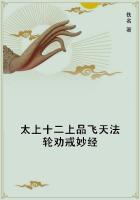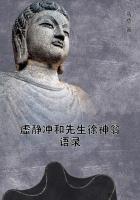"Granted also." And who can compel you to desire what you do not wish? "No man." And to propose, or intend, or in short to make use of the appearances which present themselves, can any man compel you? "He cannot do this: but he will hinder me when I desire from obtaining what I desire." If you desire anything which is your own, and one of the things which cannot be hindered, how will he hinder you? "He cannot in any way." Who, then, tells you that he who desires the things that belong to another is free from hindrance?
"Must I, then, not desire health?" By no means, nor anything else that belongs to another: for what is not in your power to acquire or to keep when you please, this belongs to another. Keep, then, far from it not only your hands but, more than that, even your desires. If you do not, you have surrendered yourself as a slave; you have subjected your neck, if you admire anything not your own, to everything that is dependent on the power of others and perishable, to which you have conceived a liking. "Is not my hand my own?" It is a part of your own body; but it is by nature earth, subject to hindrance, compulsion, and the slave of everything which is stronger. And why do I say your hand? You ought to possess your whole body as a poor ass loaded, as long as it is possible, as long as you are allowed.
But if there be a press, and a soldier should lay hold of it, let it go, do not resist, nor murmur; if you do, you will receive blows, and nevertheless you will also lose the ass. But when you ought to feel thus with respect to the body, consider what remains to be done about all the rest, which is provided for the sake of the body. When the body is an ass, all the other things are bits belonging to the ass, pack-saddles, shoes, barley, fodder. Let these also go: get rid of them quicker and more readily than of the ass.
When you have made this preparation, and have practiced this discipline, to distinguish that which belongs to another from that which is your own, the things which are subject to hindrance from those which are not, to consider the things free from hindrance to concern yourself, and those which are not free not to concern yourself, to keep your desire steadily fixed to the things which do concern yourself, and turned from the things which do not concern yourself; do you still fear any man? "No one." For about what will you be afraid? about the things which are your own, in which consists the nature of good and evil? and who has power over these things? who can take them away? who can impede them? No man can, no more than he can impede God. But will you be afraid about your body and your possessions, about things which are not yours, about things which in no way concern you? and what else have you been studying from the beginning than to distinguish between your own and not your own, the things which are in your power and not in your power, the things subject to hindrance and not subject? and why have you come to the philosophers? was it that you may nevertheless be unfortunate and unhappy? You will then in this way, as I have supposed you to have done, be without fear and disturbance. And what is grief to you? for fear comes from what you expect, but grief from that which is present. But what further will you desire? For of the things which are within the power of the will, as being good and present, you have a proper and regulated desire: but of the things which are not in the power of the will you do not desire any one, and so you do not allow any place to that which is irrational, and impatient, and above measure hasty.
When, then, you are thus affected toward things, what man can any longer be formidable to you? For what has a man which is formidable to another, either when you see him or speak to him or, finally, are conversant with him? Not more than one horse has with respect to another, or one dog to another, or one bee to another bee. Things, indeed, are formidable to every man; and when any man is able to confer these things on another or to take them away, then he too becomes formidable. How then is an acropolis demolished?
Not by the sword, not by fire, but by opinion. For if we abolish the acropolis which is in the city, can we abolish also that of fever, and that of beautiful women? Can we, in a word, abolish the acropolis which is in us and cast out the tyrants within us, whom we have dally over us, sometimes the same tyrants, at other times different tyrants? But with this we must begin, and with this we must demolish the acropolis and eject the tyrants, by giving up the body, the parts of it, the faculties of it, the possessions, the reputation, magisterial offices, honours, children, brothers, friends, by considering all these things as belonging to others. And if tyrants have been ejected from us, why do I still shut in the acropolis by a wall of circumvallation, at least on my account; for if it still stands, what does it do to me? why do I still eject guards? For where do I perceive them? against others they have their fasces, and their spears, and their swords.
But I have never been hindered in my will, nor compelled when I did not will. And how is this possible? I have placed my movements toward action in obedience to God. Is it His will that I shall have fever? It is my will also. Is it His will that I should move toward anything? It is my will also. Is it His will that I should obtain anything? It is my wish also. Does He not will? I do not wish. Is it His will that I be put to the rack? It is my will then to die; it is my will then to be put to the rack. Who, then, is still able to hinder me contrary to my own judgement, or to compel me? No more than he can hinder or compel Zeus.
Thus the more cautious of travelers also act. A traveler has heard that the road is infested by robbers; he does not venture to enter on it alone, but he waits for the companionship on the road either of an ambassador, or of a quaestor, or of a proconsul, and when he has attached himself to such persons he goes along the road safely. So in the world the wise man acts.















